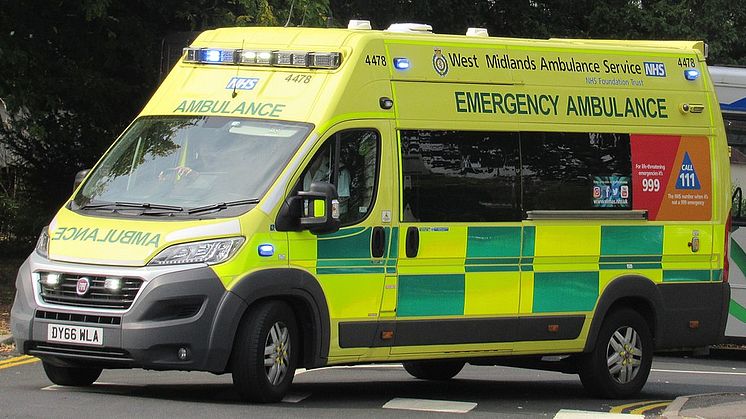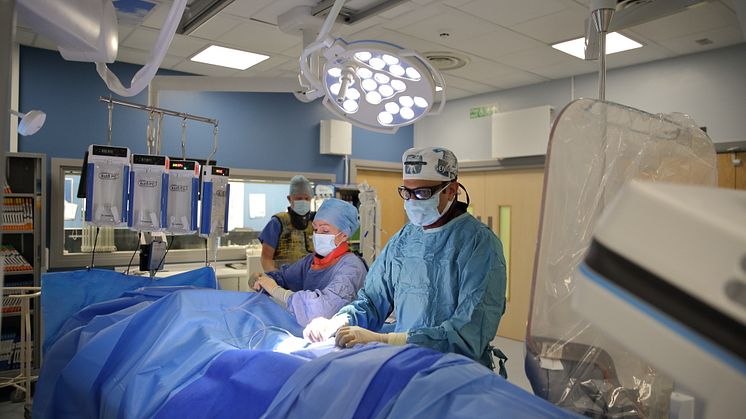
Press release -
Tens of thousands of emergency patients waited nearly two hours for ambulances
More than 37,000 people who called 999 in June 2022 with emergencies including suspected stroke waited an over an hour for an ambulance, today’s (14.07.22) figures show.
Today’s data release from NHS England shows that the average response time to category 2 emergencies like stroke was over 50 minutes (00:51:38), nearly three times the 18 minute response time target. The 90th centile target of 40 minutes also was not met, as this took 1 hour and 54 minutes (01:54:17) in June 2022.
Juliet Bouverie OBE, Chief Executive of the Stroke Association, said: “Stroke is a medical emergency and every minute is critical. I am incredibly worried that this chronic crisis situation for the ambulance service could have life-threatening consequences for thousands of stroke patients. Over the past few years, ambulance delays and the time taken for stroke patients to get appropriate treatments have both crept up. We’re extremely worried at the Stroke Association that stroke survivors’ lives and recoveries are being put at extreme risk. Ambulance delays have a domino effect, resulting in delayed or missed chances for treatment and can result in severe disability or worse death.
“We’re now at a crisis situation where every ambulance service is on the highest level of alert. This has been caused by an unacceptable failure to properly resource our NHS and this is causing death and severe disability. The government and NHS leaders must urgently address NHS staffing issues within ambulance services, hospitals and social care services. Ambulance leaders and NHS staff need to work together to prioritise addressing handover delays. NHS England should address the wider system challenges in its upcoming Urgent & Emergency Care Plan, to mitigate ambulance pressures that prevent quick access to stroke treatments like thrombectomy.
“We’re hugely grateful to ambulance call handlers, paramedics and stroke clinicians who are working tirelessly under extreme pressure, which has been exacerbated by rising Covid numbers and the heat. But despite their best efforts, systemic challenges are severely compromising ambulance response and hospital treatment times. And we are hearing shocking accounts from stroke survivors who have waited hours for an ambulance. Long ambulance delays are a symptom of a failing health and social care system. There’s a perfect storm of pressures, with soaring demand for services, a shortfall of hospital and care home beds, and staff shortages, resulting in a failure to get people in, through and out of hospital into follow-up care.
“Despite these ongoing challenges our advice to the public remains the same. If you spot the signs of a stroke in you or someone else, it’s vital to call 999 straight away. This lines up getting scanned and seen by a stroke specialist as soon as possible when you arrive at hospital giving you or a loved one the best chance of survival and recovery.”
There are 1.3 million stroke survivors in the UK, and more than 100,000 strokes annually. Most recent data show that stroke, a sudden brain attack, is fatal for one in eight (13.2%) patients. This is because for every minute a stroke goes untreated, 1.9 million brain cells die. The extra time taken for an ambulance to arrive increases the probability of avoidable death or severe disability as a consequence of stroke. The Stroke Association is incredibly concerned that the deepening crisis in ambulance services and emergency care is putting many patients at risk of experiencing more severe effects of stroke.
Around 87% of strokes are caused by a blood clot in the brain. The most widely used treatment is thrombolysis - ‘clot-busting’ drugs. For most people, thrombolysis must be administered within four and a half hours of stroke symptoms starting and get less effective as time goes on. Other treatments, such as mechanical thrombectomy, rely on similarly specific time windows and are more effective the sooner they are performed.
ENDS
For more information, please contact Scott Weddell, PR Manager at the Stroke Association, at scott.weddell@stroke.org.uk or 02075660337
Notes to Editors
Category 2 Response times Ambulance Service Count of Incidents Total (hours) Mean (min:sec) 90th
|
Category 2 |
|
|
|
|
|
Ambulance Service |
Count of incidents |
Total (hours) |
Mean (min:sec) |
90th centile (hours:mins:sec) |
|
England |
372,327 |
320,438 |
51:38 |
01:54:17 |
|
East Midlands |
34,759 |
41,621 |
01:11:51 |
02:38:30 |
|
East of England |
37,110 |
35,129 |
56:48 |
02:02:30 |
|
Isle of Wight |
1,172 |
545 |
27:53 |
55:24 |
|
London |
52,640 |
48,890 |
55:44 |
02:03:29 |
|
North East |
20,286 |
14,878 |
44:00 |
01:32:45 |
|
North West |
48,225 |
31,959 |
39:46 |
01:27:30 |
|
South Central |
25,859 |
18,737 |
43:28 |
01:29:16 |
|
South East Coast |
32,091 |
18,996 |
35:31 |
01:14:10 |
|
South Western |
36,290 |
42,239 |
01:09:50 |
02:36:56 |
|
West Midlands |
46,622 |
40,544 |
52:11 |
02:05:50 |
|
Yorkshire |
37,273 |
26,902 |
43:18 |
01:35:57 |
|
Data available here: https://www.england.nhs.uk/statistics/statistical-work-areas/ambulance-quality-indicators/ambulance-quality-indicators-data-2022-23/ |
Related links
Topics
Categories
- Stroke strikes every five minutes in the UK and it changes lives in an instant.
- The Stroke Association is a charity working across the UK to support people to rebuild their lives after stroke. We believe that everyone deserves to live the best life they can after stroke. From local support services and groups, to online information and support, anyone affected by stroke can visit stroke.org.uk or call our dedicated Stroke Helpline on 0303 3033 100 to find out about support available locally.
- Our specialist support, research and campaigning are only possible with the courage and determination of the stroke community and the generosity of our supporters. With more donations and support, we can help rebuild even more lives.
- You can follow us on Twitter, Facebook and Instagram.













